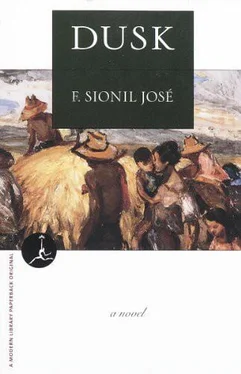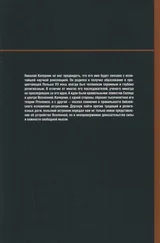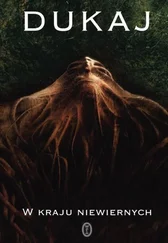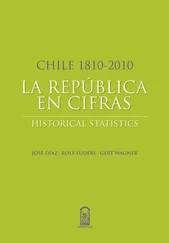The general rode to where Istak sat on a shoulder of the narrow pass. His gold epaulets shone. He had been viewing the surrounding flanks with his field glasses and he seemed satisfied with what he saw. “Do you think they marched in the night, Eustaquio?”
“I do not know, Señor General,” Istak said. “I am not sure. It seems they are afraid to fight at night.”
Istak could see better now; the trenches were rimmed with earthworks. On both sides of the pass, soldiers were stationed behind boulders, but instinct told him at once — although he was no soldier — that there should have been trenches way up to his left, up to the peak of Tirad itself. It would be a difficult climb for the enemy to make, to crawl up that cliff and cross the ravine now covered with grass, but anyone who persevered could do it.
Would it do to tell the general, this imperious young man, what he had missed? He had had so much experience, he had lived through battles, and he, Istak, had never been in one.
Still, there was time to do it. He went to the solitary figure at the crest of the pass. The general was seated on a boulder, looking down in the direction of Angaki on the opposite side. What were the thoughts rankling him? He had but a handful of men to block the oncoming horde.
“My general,” Istak said. “Please do not be angry with me — but I know this pass. I have crossed it several times.”
Del Pilar looked up from his perch and there was a brief flash of kindness in the young eyes.
“Yes, Ilokano,” he said. “What do you want to tell me?”
“That side to your left, there is a trail there — maybe you think it cannot be scaled, but it can—”
The general smiled. “I have thought of that,” he said coolly. “But the Americans — they are not all that persevering. They don’t have the patience. There are so many of them, and so well-equipped — they will not do it the difficult way. They will do it the easy way — like it has always been …”
Istak bowed. Why was this boy so sure of himself? What bravado was this? Or courage?
A shout erupted from below; the air tensed quickly. A soldier raced up to the general. “They are here, my general. We wait no more!”
The general turned to where the soldier had pointed. A line of blue ants was clambering up the slope, dodging behind boulders disappearing in the tall grass, perhaps two hundred of them, five hundred even — and more farther down.
The general turned to him and spoke curtly. “I have been generous — perhaps, you can see that. You can save your life now by going down the mountain and joining the Americans. You will carry a white flag so they will not shoot you. This is the only way out for you. And you have my word that you will not have a bullet in your back. So go, Eustaquio — while there is still time.”
Istak listened, his chest tightening, his whole being aflame. A soldier had flung disdainfully before him a bamboo pole and to it was tied a big white kerchief. He looked at it, but he must not be angry, he must suppress all the emotion that sought to erupt in him as it had once, the anger at the Guardia, at what he saw in Baugen, and now, toward this dumb, unfeeling dolt of a boy, so very much like the new priest who had replaced Padre Jose, so full of life and yet so distrustful and vicious. But the general was doing what he thought was right, he was a soldier who commanded the loyalty of all these men, all of them older than himself. He had turned and marched away, he was down the pass, and Istak could hear him exhorting the men, though he did not understand Tagalog too well.
He was rejected, then. But there was no one who could reject what he would do, and he would do it not because he wanted to prove them wrong; he would do it because now, there could be no denial, not after Po-on, not after Baugen.
He looked disdainfully at the white flag and detached it from the pole. Rising, he flung the pole away in the direction of the enemy, then folded the kerchief neatly and laid it on the grass. He would stay, he would care for the wounded, for surely there would be many.
He turned to his left, to the soldier posted there; he was dark, with very grave features, but the man was smiling at him.
“Cover, cover,” the soldier said, thrusting a chin toward the boulders on the shoulder of the rise.
Istak nodded, and said thank you in Tagalog, but did not go to the boulders. He walked, instead, to the trenches down the pass. That was where most of the men were positioned and that was where he would be needed. There was no firing still, just this waiting that tightened the nerves and parched the mouth. He could still run, as the general had said, toward the enemy and live. He had chosen to stay. Alive, he could still follow, convince the president, run errands, aid the wounded, or simply help them through the hostile Igorot lands. But there was a wearying tiredness in his bones, a gasping for breath, a deadening in his flesh — perhaps he should not run anymore.
It was such a beautiful Saturday morning; the sky was pale blue, and clouds white as newly harvested cotton floated along the far horizon. Mountains, mountains all around — it did not seem that he had traveled so far and he would still have so many mountains to cross; he should stop here now, so that his flesh, his blood, could blend inexorably with this land. Rain on parched earth, benediction.
His gaze wandered to the distance below; they were still very far off, but he could see them clearly, shapes moving up the steep curves of the trail, shirts vivid blue against the bright green grass.
Is this then the final flood? And who can escape it when even this mountainside would surely be submerged by it? There came to mind quickly again, Si Dominus custodierit civitatem frustra vigilat qui custodit eam .
I do not watch in vain, and it is not God who is fighting against my city. I am a man of peace, I will not throw a single stone. My words, my thoughts may be hostile, but my deeds will speak of love. I will try to give love and light to those who need them …
But would he do this now? Those were no brutal illusions — the anguish, the death he had seen in Baugen, and in remembering, Istak shuddered. The nightmare would not pass — it was living blood which he had touched, it was a dead girl he had cradled in his arms, and the homes that went up in flames were homes of living people, just like Po-on had been, just like Cabugawan was now.
It is for Dalin, then, for my boys, for my neighbors who do not know of the struggle for this lonely summit. The few of us who are here waiting — we can hold back the flood, and even if it were to immerse us all, it would have to ebb and we could raise our heads again.
All around was stillness, strained breathing. All around was this clearness, not of doom but of life. Men defying steel — they were not like him, they were trained to kill, and he had never held a gun; he did not know how to load one, much less aim one and play God.
The general had dismounted; he marched up the pass, telling his men in Tagalog, and now in Spanish as well, that they should wait till they had those blue shirts clear in their sights. Then and only then, he was telling them, although he himself perhaps was trembling, not to be afraid, that since they would not get out of this alive anyway, they should die like men. “Like men — understand? How many men are left in the world? You there, Kulas, you have no beard and no beard will ever grow on that face. But I know you have testicles. You are a man, are you not, Kulas?”
Laughter.
“Maybe, my general.”
More laughter.
It was eerie, the laughter that welled from them on this early morning.
The general mounted his horse again and rode to the edge of the pass, to the promontory where from down below he could be seen.
Читать дальше












